2024届高三英语一轮复习:情态动词和虚拟语气课件(共22张PPT)
文档属性
| 名称 | 2024届高三英语一轮复习:情态动词和虚拟语气课件(共22张PPT) |  | |
| 格式 | pptx | ||
| 文件大小 | 129.0KB | ||
| 资源类型 | 教案 | ||
| 版本资源 | 通用版 | ||
| 科目 | 英语 | ||
| 更新时间 | 2023-12-21 10:31:19 | ||
图片预览

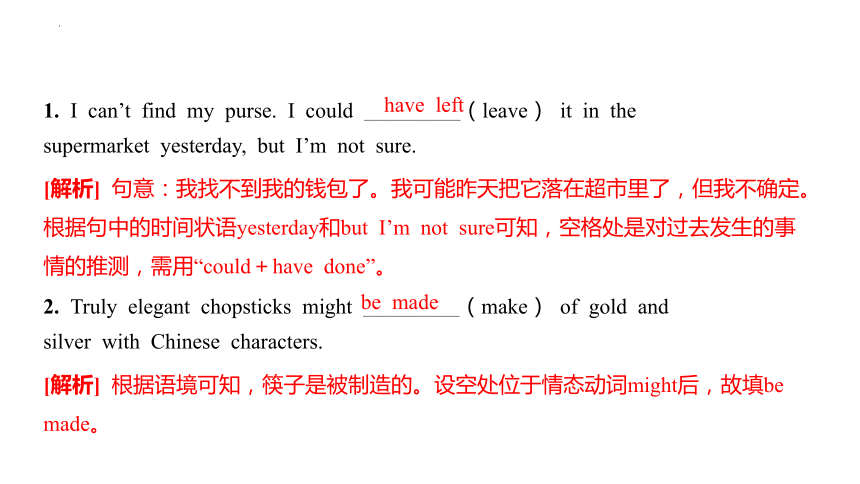
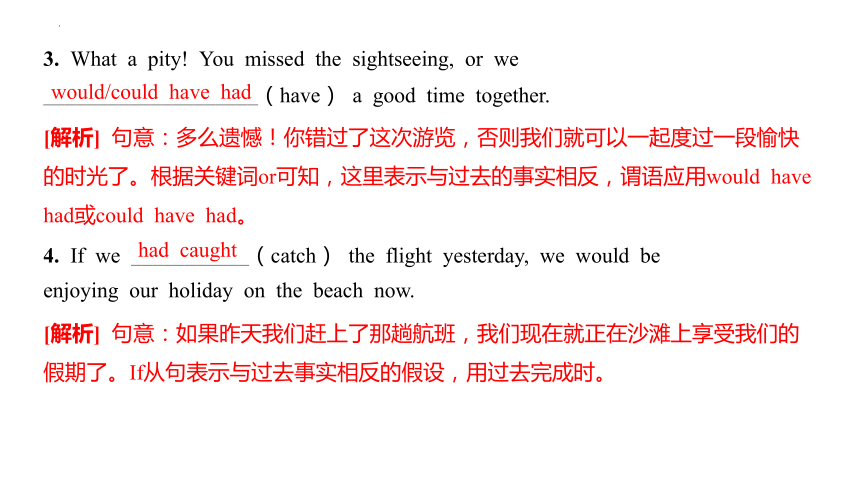
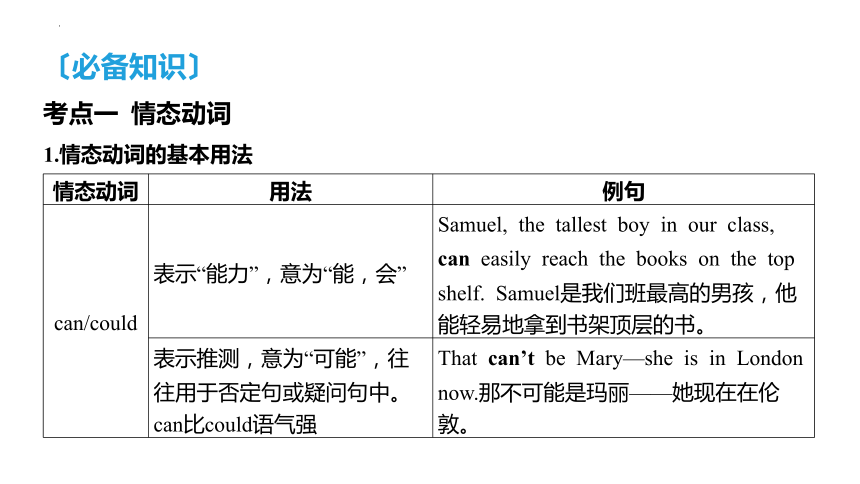
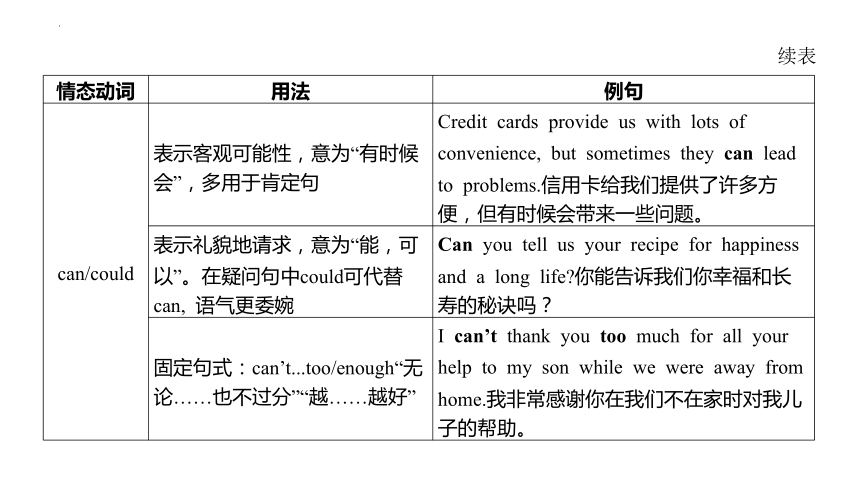
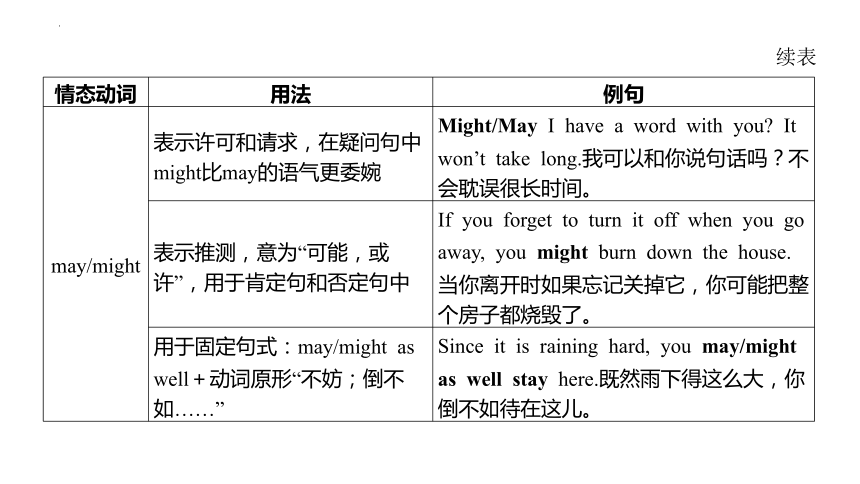
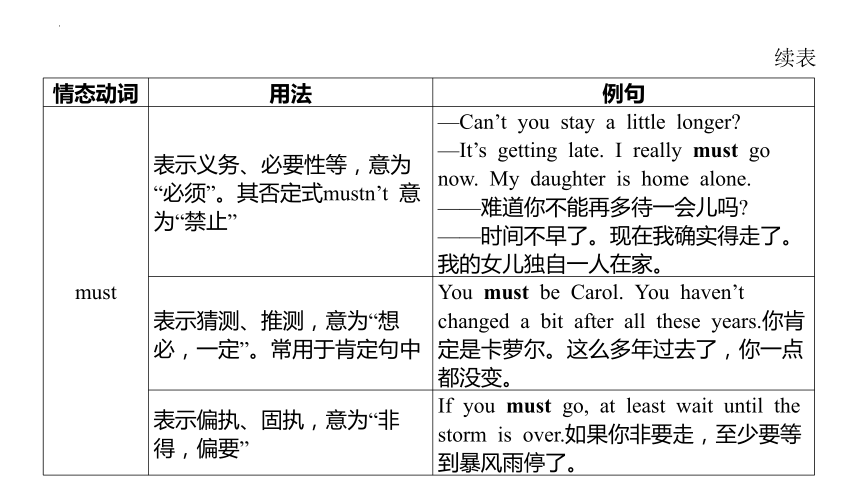
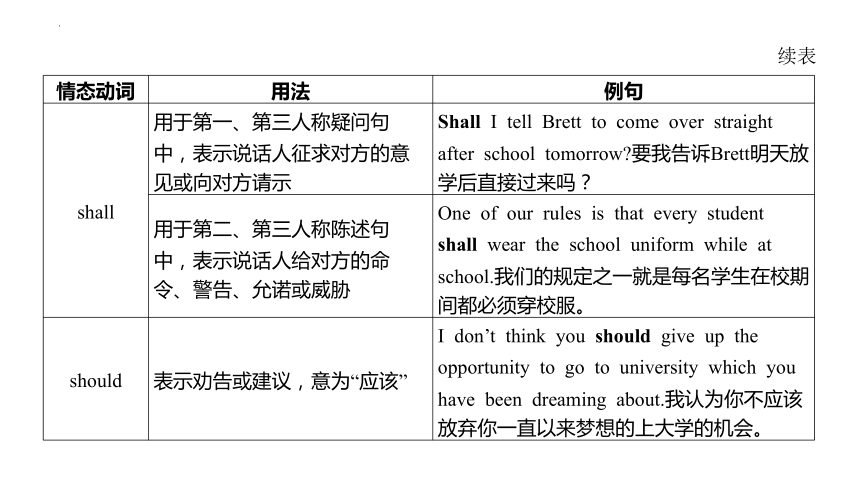
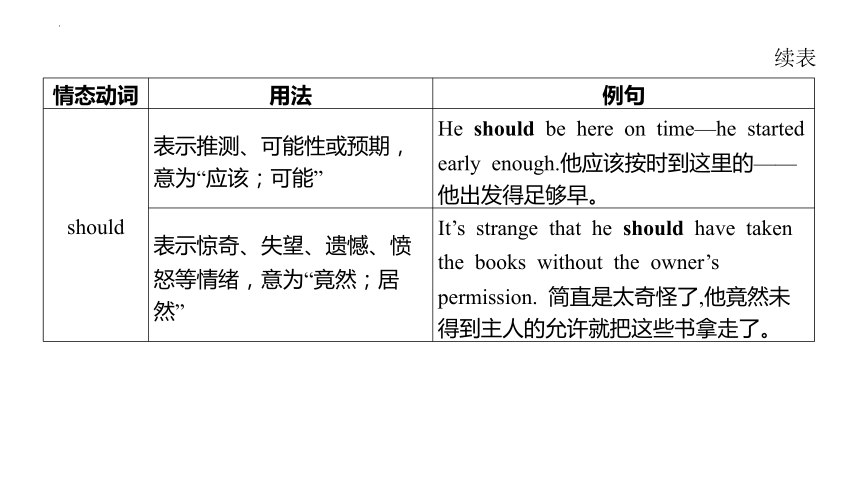
文档简介
(共22张PPT)
情态动词和虚拟语气
1. I can’t find my purse. I could _________(leave) it in the
supermarket yesterday, but I’m not sure.
have left
[解析] 句意:我找不到我的钱包了。我可能昨天把它落在超市里了,但我不确定。根据句中的时间状语yesterday和but I’m not sure可知,空格处是对过去发生的事情的推测,需用“could+have done”。
2. Truly elegant chopsticks might _________(make) of gold and
silver with Chinese characters.
be made
[解析] 根据语境可知,筷子是被制造的。设空处位于情态动词might后,故填be made。
3. What a pity! You missed the sightseeing, or we
____________________(have) a good time together.
would/could have had
[解析] 句意:多么遗憾!你错过了这次游览,否则我们就可以一起度过一段愉快的时光了。根据关键词or可知,这里表示与过去的事实相反,谓语应用would have had或could have had。
4. If we ___________(catch) the flight yesterday, we would be
enjoying our holiday on the beach now.
had caught
[解析] 句意:如果昨天我们赶上了那趟航班,我们现在就正在沙滩上享受我们的假期了。If从句表示与过去事实相反的假设,用过去完成时。
〔必备知识〕
考点一 情态动词
1.情态动词的基本用法
情态动词 用法 例句
can/could 表示“能力”,意为“能,会” Samuel, the tallest boy in our class,
can easily reach the books on the top
shelf. Samuel是我们班最高的男孩,他
能轻易地拿到书架顶层的书。
表示推测,意为“可能”,往 往用于否定句或疑问句中。 can比could语气强 That can’t be Mary—she is in London
now.那不可能是玛丽——她现在在伦
敦。
情态动词 用法 例句
can/could 表示客观可能性,意为“有时候 会”,多用于肯定句 Credit cards provide us with lots of
convenience, but sometimes they can lead
to problems.信用卡给我们提供了许多方
便,但有时候会带来一些问题。
表示礼貌地请求,意为“能,可 以”。在疑问句中could可代替 can, 语气更委婉 Can you tell us your recipe for happiness
and a long life 你能告诉我们你幸福和长
寿的秘诀吗?
固定句式:can’t...too/enough“无 论……也不过分”“越……越好” I can’t thank you too much for all your
help to my son while we were away from
home.我非常感谢你在我们不在家时对我儿
子的帮助。
续表
情态动词 用法 例句
may/might 表示许可和请求,在疑问句中 might比may的语气更委婉 Might/May I have a word with you It
won’t take long.我可以和你说句话吗?不
会耽误很长时间。
表示推测,意为“可能,或 许”,用于肯定句和否定句中 If you forget to turn it off when you go
away, you might burn down the house.
当你离开时如果忘记关掉它,你可能把整
个房子都烧毁了。
用于固定句式:may/might as well+动词原形“不妨;倒不 如……” Since it is raining hard, you may/might
as well stay here.既然雨下得这么大,你
倒不如待在这儿。
续表
情态动词 用法 例句
must 表示义务、必要性等,意为 “必须”。其否定式mustn’t 意 为“禁止” —Can’t you stay a little longer
—It’s getting late. I really must go
now. My daughter is home alone.
——难道你不能再多待一会儿吗
——时间不早了。现在我确实得走了。
我的女儿独自一人在家。
表示猜测、推测,意为“想 必,一定”。常用于肯定句中 You must be Carol. You haven’t
changed a bit after all these years.你肯
定是卡萝尔。这么多年过去了,你一点
都没变。
表示偏执、固执,意为“非 得,偏要” If you must go, at least wait until the
storm is over.如果你非要走,至少要等
到暴风雨停了。
续表
情态动词 用法 例句
shall 用于第一、第三人称疑问句 中,表示说话人征求对方的意 见或向对方请示 Shall I tell Brett to come over straight
after school tomorrow 要我告诉Brett明天放
学后直接过来吗?
用于第二、第三人称陈述句 中,表示说话人给对方的命 令、警告、允诺或威胁 One of our rules is that every student
shall wear the school uniform while at
school.我们的规定之一就是每名学生在校期
间都必须穿校服。
should 表示劝告或建议,意为“应该” I don’t think you should give up the
opportunity to go to university which you
have been dreaming about.我认为你不应该
放弃你一直以来梦想的上大学的机会。
续表
情态动词 用法 例句
should 表示推测、可能性或预期, 意为“应该;可能” He should be here on time—he started
early enough.他应该按时到这里的——
他出发得足够早。
表示惊奇、失望、遗憾、愤 怒等情绪,意为“竟然;居 然” It’s strange that he should have taken
the books without the owner’s
permission. 简直是太奇怪了,他竟然未
得到主人的允许就把这些书拿走了。
续表
情态动词 用法 例句
will/would 表示意志或意愿。will指现在, would指过去 I have told him again and again to stop
smoking, but he will not listen.
我已再三告诉他戒烟,但他就是不听。
表示习惯性动作,意为“总是”, will指现在,would指过去 I still remember my happy childhood when
my mother would take me to Disneyland
at weekends.
我仍旧记得我快乐的童年,那时我妈妈经
常在周末带我去迪士尼乐园。
表示征求意见或提出请求,多 用于第二人称疑问句中。would 比will语气委婉 Will/Would you please let me have a look
at your new watch 请让我看看你的新手表
好吗?
续表
情态动词 用法 例句
need need表示必要性,常用于疑 问句和否定句中,needn’t表 示“不必”。need 作实义动词 时,可用于肯定句、否定句 和疑问句中,有人称、数和 时态的变化,其后可接名 词、代词、带to的不定式或 动名词作宾语 My room is in a mess, but I needn’t
clean it before I go out tonight. 我的
房间里乱糟糟的,不过我今天晚上出门
之前没必要打扫它。
Since you have known it already, we
don’t need to keep it a secret.既然你
已经知道了,我们就没有必要保密了。
续表
情态动词 用法 例句
dare dare意为“敢,敢于”,主要用 于疑问句、否定句和条件从 句中,后接动词原形。作实 义动词时,在肯定句中通常 接带to的不定式,在疑问句 和否定句中,dare之后的to可 省略 How dare you leave your home
without your parents’ permission 在没
有征得你父母同意的情况下你怎么敢离
开家?
Most people hate Harry but they don’t
dare (to) say so.大多数人讨厌哈
里,但他们敢怒不敢言。
续表
2.情态动词+have done
对过去的推测 must have done 一定做过某事 Paul did a great job in the
speech contest. He must have
practised many times last week.
保罗在演讲比赛中表现得很好。
他上周一定练习了很多次。
George can’t have gone too
far. His coffee is still warm.乔
治不可能走得太远。他的咖啡还
是温的呢。
can’t/couldn’t have done 过去不可能做 过…… may/might have done 过去可能做 过…… may/might not have done 过去可能没有 做过…… 对过去情况的后 悔、遗憾或责备 could have done 本来能够做但 却未做 I thought you might have
invited her over.我想你大概已
经邀请她过来。
You should have studied
harder. 你本应该更努力学习
的。
You needn’t have told him
that.你本来用不着告诉他那个
的。
should have done 本来应该做但 是实际上未做 shouldn’t have done 本来不应该做 而实际上做了 needn’t have done 本来没必要做 却做了 续表
考点二 虚拟语气
1.虚拟条件句中的虚拟语气
虚拟语气 主句谓语动词 从句谓语动词 例句
虚拟现在 should/would/coul d/might+do 过去式(be用 were) If I were at school again, I
would study harder.如果我再次上学
的话,我会更加努力地学习。
虚拟过去 should/would/coul d/might+have done had+done They might have found a better
hotel if they had driven a few
more kilometers.如果他们多开几公
里的话,他们也许会找到一个更好
的旅馆。
虚拟语气 主句谓语动词 从句谓语动词 例句
虚拟将来 should/would/coul d/might+do 过去式/were to do/should +do Grace doesn’t want to move to
New York because she thinks if she
were to live there, she wouldn’t
be able to see her parents very
often.格雷斯不想搬到纽约,因为她
认为如果住在那里,她就不能经常
看到她的父母了。
续表
2.含蓄虚拟语气
有时假设的条件不通过条件状语从句表达出来,而是隐含在某些词或短语中,或隐含在上下文中,这叫含蓄虚拟语气。常用的这类词或短语有:without(要是)没有;but for要不是;otherwise/or否则等。
The workers were not better organized, otherwise they would have accomplished the task in half the time. 工人们没有被更好地组织起来,否则他们用一半的时间就能完成这项任务。
3.虚拟语气在从句中的用法
在表示要求、命令、建议、坚持等动词后接的宾语从句中,以及表示上述意义的名词后的表语从句中,从句中的谓语动词用“(should+)动词原形”。常见的此类动词有:一坚持(insist)、二命令(order, command)、三要求(require, demand, request)、四建议(suggest, advise, propose, recommend)。
She suggested that Dale (should) join the debating team, believing that practice in speaking could give him the confidence and recognition that he needed.她建议戴尔加入辩论队,她认为演讲练习会给予他所需要的信心和认可。
My suggestion was that necessary measures (should) be taken to protect the children from dangerous situations.我的建议是采取必要措施来保护儿童使他们远离危险的境遇。
易错提示
(1)当suggest作“暗示,表明”讲,insist作“坚持认为”讲时,从句要用陈述语气。
(2)在“It is/was+adj./done+that...”句型中,从句中的谓语动词用“(should+)动词原形”。常见的形容词或过去分词有:important、necessary、strange、suggested、required、ordered、advised、requested、demanded 等。
It is necessary that we (should) clean the room every day.我们每天打扫房间是有必要的。
It is required that middle school students (should) take at least one hour’s exercise every day.中学生被要求每天至少进行一个小时的锻炼。
(3)wish后的宾语从句中,从句用一般过去时表示对现在的虚拟;从句用“would/could+动词原形”表示对将来的虚拟;从句用过去完成时表示对过去的虚拟。We will go shopping tomorrow. I wish you would go with us.我们明天要去购物,我希望你同我们一起去。
I wish I had told him the way to the supermarket.我真希望我已经告诉了他到超市的路线。
(4)would rather后的宾语从句中,从句用一般过去时表示对现在或将来的虚拟;从句用过去完成时表示对过去的虚拟。
I’d rather he had gone to the seaside with me the day before yesterday.我宁愿他前天和我去了海边。
4.三个固定句式中的虚拟语气
句式 现在 过去 将来
if only引导的条件从句及感叹 句 过去式 had+过去分词 would/could+动词原形
as if/though引导的表语从句及 方式状语从句 过去式 had+过去分词 /
It is (high) time that... 过去式或should+动词原形 Look at the trouble we are in. If only we had taken our teacher’s advice!看看我们所处的困境,要是我们当初听从老师的建议该多好!
Mary’s description of the party was so vivid that I felt as if I had been there.玛丽对这次聚会的描述是如此生动,以至于我觉得我好像去过那里一样。
It is high time that we took/should take some measures to solve the problem.确实到了我们采取一些措施来解决这个问题的时候了。
情态动词和虚拟语气
1. I can’t find my purse. I could _________(leave) it in the
supermarket yesterday, but I’m not sure.
have left
[解析] 句意:我找不到我的钱包了。我可能昨天把它落在超市里了,但我不确定。根据句中的时间状语yesterday和but I’m not sure可知,空格处是对过去发生的事情的推测,需用“could+have done”。
2. Truly elegant chopsticks might _________(make) of gold and
silver with Chinese characters.
be made
[解析] 根据语境可知,筷子是被制造的。设空处位于情态动词might后,故填be made。
3. What a pity! You missed the sightseeing, or we
____________________(have) a good time together.
would/could have had
[解析] 句意:多么遗憾!你错过了这次游览,否则我们就可以一起度过一段愉快的时光了。根据关键词or可知,这里表示与过去的事实相反,谓语应用would have had或could have had。
4. If we ___________(catch) the flight yesterday, we would be
enjoying our holiday on the beach now.
had caught
[解析] 句意:如果昨天我们赶上了那趟航班,我们现在就正在沙滩上享受我们的假期了。If从句表示与过去事实相反的假设,用过去完成时。
〔必备知识〕
考点一 情态动词
1.情态动词的基本用法
情态动词 用法 例句
can/could 表示“能力”,意为“能,会” Samuel, the tallest boy in our class,
can easily reach the books on the top
shelf. Samuel是我们班最高的男孩,他
能轻易地拿到书架顶层的书。
表示推测,意为“可能”,往 往用于否定句或疑问句中。 can比could语气强 That can’t be Mary—she is in London
now.那不可能是玛丽——她现在在伦
敦。
情态动词 用法 例句
can/could 表示客观可能性,意为“有时候 会”,多用于肯定句 Credit cards provide us with lots of
convenience, but sometimes they can lead
to problems.信用卡给我们提供了许多方
便,但有时候会带来一些问题。
表示礼貌地请求,意为“能,可 以”。在疑问句中could可代替 can, 语气更委婉 Can you tell us your recipe for happiness
and a long life 你能告诉我们你幸福和长
寿的秘诀吗?
固定句式:can’t...too/enough“无 论……也不过分”“越……越好” I can’t thank you too much for all your
help to my son while we were away from
home.我非常感谢你在我们不在家时对我儿
子的帮助。
续表
情态动词 用法 例句
may/might 表示许可和请求,在疑问句中 might比may的语气更委婉 Might/May I have a word with you It
won’t take long.我可以和你说句话吗?不
会耽误很长时间。
表示推测,意为“可能,或 许”,用于肯定句和否定句中 If you forget to turn it off when you go
away, you might burn down the house.
当你离开时如果忘记关掉它,你可能把整
个房子都烧毁了。
用于固定句式:may/might as well+动词原形“不妨;倒不 如……” Since it is raining hard, you may/might
as well stay here.既然雨下得这么大,你
倒不如待在这儿。
续表
情态动词 用法 例句
must 表示义务、必要性等,意为 “必须”。其否定式mustn’t 意 为“禁止” —Can’t you stay a little longer
—It’s getting late. I really must go
now. My daughter is home alone.
——难道你不能再多待一会儿吗
——时间不早了。现在我确实得走了。
我的女儿独自一人在家。
表示猜测、推测,意为“想 必,一定”。常用于肯定句中 You must be Carol. You haven’t
changed a bit after all these years.你肯
定是卡萝尔。这么多年过去了,你一点
都没变。
表示偏执、固执,意为“非 得,偏要” If you must go, at least wait until the
storm is over.如果你非要走,至少要等
到暴风雨停了。
续表
情态动词 用法 例句
shall 用于第一、第三人称疑问句 中,表示说话人征求对方的意 见或向对方请示 Shall I tell Brett to come over straight
after school tomorrow 要我告诉Brett明天放
学后直接过来吗?
用于第二、第三人称陈述句 中,表示说话人给对方的命 令、警告、允诺或威胁 One of our rules is that every student
shall wear the school uniform while at
school.我们的规定之一就是每名学生在校期
间都必须穿校服。
should 表示劝告或建议,意为“应该” I don’t think you should give up the
opportunity to go to university which you
have been dreaming about.我认为你不应该
放弃你一直以来梦想的上大学的机会。
续表
情态动词 用法 例句
should 表示推测、可能性或预期, 意为“应该;可能” He should be here on time—he started
early enough.他应该按时到这里的——
他出发得足够早。
表示惊奇、失望、遗憾、愤 怒等情绪,意为“竟然;居 然” It’s strange that he should have taken
the books without the owner’s
permission. 简直是太奇怪了,他竟然未
得到主人的允许就把这些书拿走了。
续表
情态动词 用法 例句
will/would 表示意志或意愿。will指现在, would指过去 I have told him again and again to stop
smoking, but he will not listen.
我已再三告诉他戒烟,但他就是不听。
表示习惯性动作,意为“总是”, will指现在,would指过去 I still remember my happy childhood when
my mother would take me to Disneyland
at weekends.
我仍旧记得我快乐的童年,那时我妈妈经
常在周末带我去迪士尼乐园。
表示征求意见或提出请求,多 用于第二人称疑问句中。would 比will语气委婉 Will/Would you please let me have a look
at your new watch 请让我看看你的新手表
好吗?
续表
情态动词 用法 例句
need need表示必要性,常用于疑 问句和否定句中,needn’t表 示“不必”。need 作实义动词 时,可用于肯定句、否定句 和疑问句中,有人称、数和 时态的变化,其后可接名 词、代词、带to的不定式或 动名词作宾语 My room is in a mess, but I needn’t
clean it before I go out tonight. 我的
房间里乱糟糟的,不过我今天晚上出门
之前没必要打扫它。
Since you have known it already, we
don’t need to keep it a secret.既然你
已经知道了,我们就没有必要保密了。
续表
情态动词 用法 例句
dare dare意为“敢,敢于”,主要用 于疑问句、否定句和条件从 句中,后接动词原形。作实 义动词时,在肯定句中通常 接带to的不定式,在疑问句 和否定句中,dare之后的to可 省略 How dare you leave your home
without your parents’ permission 在没
有征得你父母同意的情况下你怎么敢离
开家?
Most people hate Harry but they don’t
dare (to) say so.大多数人讨厌哈
里,但他们敢怒不敢言。
续表
2.情态动词+have done
对过去的推测 must have done 一定做过某事 Paul did a great job in the
speech contest. He must have
practised many times last week.
保罗在演讲比赛中表现得很好。
他上周一定练习了很多次。
George can’t have gone too
far. His coffee is still warm.乔
治不可能走得太远。他的咖啡还
是温的呢。
can’t/couldn’t have done 过去不可能做 过…… may/might have done 过去可能做 过…… may/might not have done 过去可能没有 做过…… 对过去情况的后 悔、遗憾或责备 could have done 本来能够做但 却未做 I thought you might have
invited her over.我想你大概已
经邀请她过来。
You should have studied
harder. 你本应该更努力学习
的。
You needn’t have told him
that.你本来用不着告诉他那个
的。
should have done 本来应该做但 是实际上未做 shouldn’t have done 本来不应该做 而实际上做了 needn’t have done 本来没必要做 却做了 续表
考点二 虚拟语气
1.虚拟条件句中的虚拟语气
虚拟语气 主句谓语动词 从句谓语动词 例句
虚拟现在 should/would/coul d/might+do 过去式(be用 were) If I were at school again, I
would study harder.如果我再次上学
的话,我会更加努力地学习。
虚拟过去 should/would/coul d/might+have done had+done They might have found a better
hotel if they had driven a few
more kilometers.如果他们多开几公
里的话,他们也许会找到一个更好
的旅馆。
虚拟语气 主句谓语动词 从句谓语动词 例句
虚拟将来 should/would/coul d/might+do 过去式/were to do/should +do Grace doesn’t want to move to
New York because she thinks if she
were to live there, she wouldn’t
be able to see her parents very
often.格雷斯不想搬到纽约,因为她
认为如果住在那里,她就不能经常
看到她的父母了。
续表
2.含蓄虚拟语气
有时假设的条件不通过条件状语从句表达出来,而是隐含在某些词或短语中,或隐含在上下文中,这叫含蓄虚拟语气。常用的这类词或短语有:without(要是)没有;but for要不是;otherwise/or否则等。
The workers were not better organized, otherwise they would have accomplished the task in half the time. 工人们没有被更好地组织起来,否则他们用一半的时间就能完成这项任务。
3.虚拟语气在从句中的用法
在表示要求、命令、建议、坚持等动词后接的宾语从句中,以及表示上述意义的名词后的表语从句中,从句中的谓语动词用“(should+)动词原形”。常见的此类动词有:一坚持(insist)、二命令(order, command)、三要求(require, demand, request)、四建议(suggest, advise, propose, recommend)。
She suggested that Dale (should) join the debating team, believing that practice in speaking could give him the confidence and recognition that he needed.她建议戴尔加入辩论队,她认为演讲练习会给予他所需要的信心和认可。
My suggestion was that necessary measures (should) be taken to protect the children from dangerous situations.我的建议是采取必要措施来保护儿童使他们远离危险的境遇。
易错提示
(1)当suggest作“暗示,表明”讲,insist作“坚持认为”讲时,从句要用陈述语气。
(2)在“It is/was+adj./done+that...”句型中,从句中的谓语动词用“(should+)动词原形”。常见的形容词或过去分词有:important、necessary、strange、suggested、required、ordered、advised、requested、demanded 等。
It is necessary that we (should) clean the room every day.我们每天打扫房间是有必要的。
It is required that middle school students (should) take at least one hour’s exercise every day.中学生被要求每天至少进行一个小时的锻炼。
(3)wish后的宾语从句中,从句用一般过去时表示对现在的虚拟;从句用“would/could+动词原形”表示对将来的虚拟;从句用过去完成时表示对过去的虚拟。We will go shopping tomorrow. I wish you would go with us.我们明天要去购物,我希望你同我们一起去。
I wish I had told him the way to the supermarket.我真希望我已经告诉了他到超市的路线。
(4)would rather后的宾语从句中,从句用一般过去时表示对现在或将来的虚拟;从句用过去完成时表示对过去的虚拟。
I’d rather he had gone to the seaside with me the day before yesterday.我宁愿他前天和我去了海边。
4.三个固定句式中的虚拟语气
句式 现在 过去 将来
if only引导的条件从句及感叹 句 过去式 had+过去分词 would/could+动词原形
as if/though引导的表语从句及 方式状语从句 过去式 had+过去分词 /
It is (high) time that... 过去式或should+动词原形 Look at the trouble we are in. If only we had taken our teacher’s advice!看看我们所处的困境,要是我们当初听从老师的建议该多好!
Mary’s description of the party was so vivid that I felt as if I had been there.玛丽对这次聚会的描述是如此生动,以至于我觉得我好像去过那里一样。
It is high time that we took/should take some measures to solve the problem.确实到了我们采取一些措施来解决这个问题的时候了。
